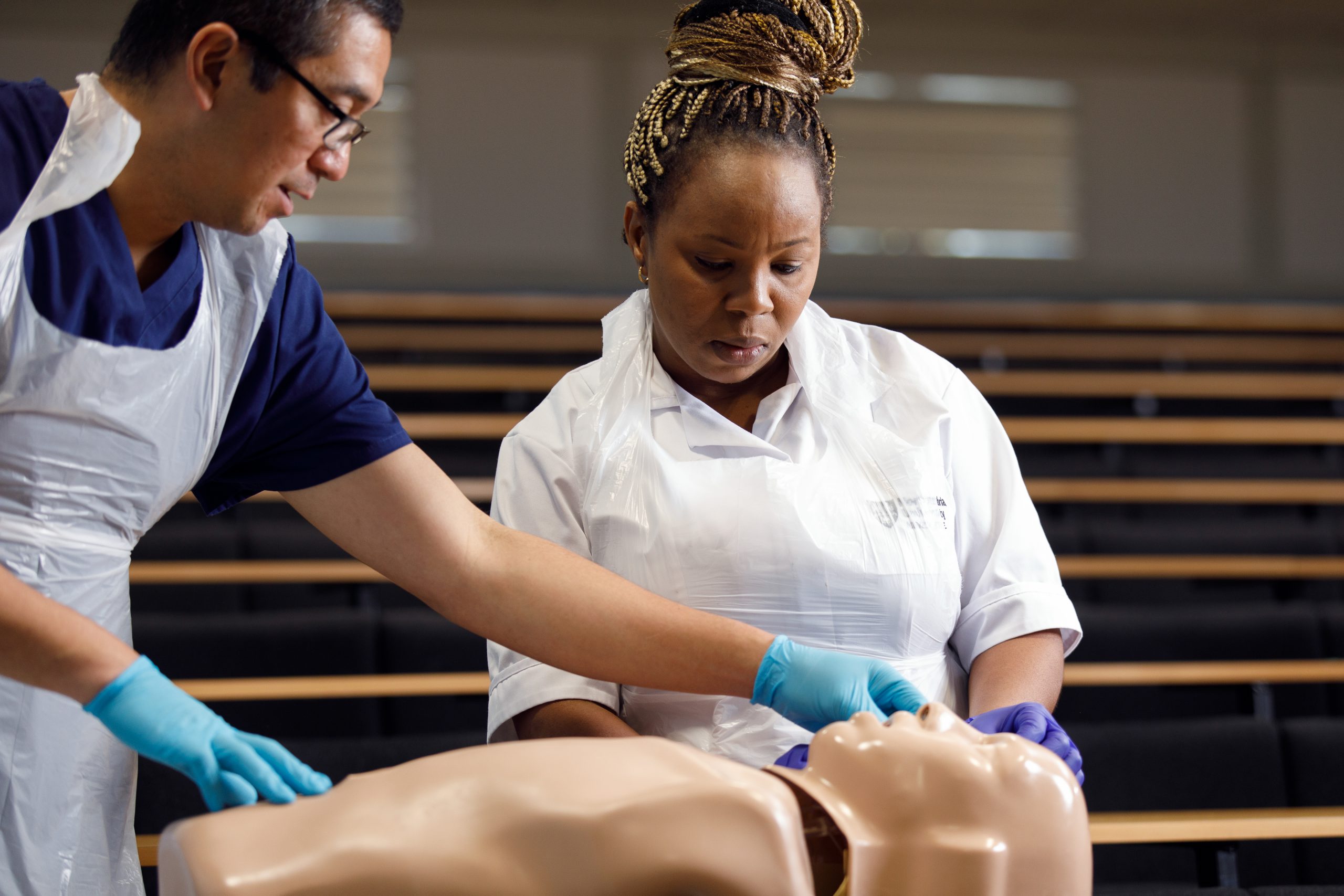How to prepare for the NMC OSCE (UK)
For internationally educated nurses and midwives, passing the Nursing and Midwifery Council (NMC) Objective Structured Clinical Examination (OSCE) is one of the final steps to practicing in the UK [1].
Although the exam can seem overwhelming, having a clear preparation strategy helps candidates approach test day with greater confidence.
This guide outlines what the OSCE is, how it is structured, how to prepare effectively, common pitfalls to avoid, and answers to frequently asked questions about the NMC OSCE.
What is the NMC OSCE?
The OSCE forms part of the NMC Test of Competence (ToC), introduced in 2021 [2]. It comprises two parts:
1. A Computer-Based Test (CBT) – usually taken overseas.
2. The OSCE – conducted in the UK at approved competence test centres. The OSCE assesses your ability to provide safe and effective nursing care in real-world clinical scenarios, covering communication, professional values, evidence-based practice, and core clinical skills [1].
Fees
The OSCE costs £794. If you need to resit seven or fewer stations, the reduced resit fee is £397 [1].
Booking Your OSCE
For initial registration:
Once confirmation is received that you must take the Test of Competence, you can book and pay for your OSCE through one of the approved test providers [1].
For readmission:
Candidates can schedule their Test of Competence via their NMC Online account. Once this is done, an email will be sent with details on how to book and pay for the OSCE with a chosen test provider [1].
NMC OSCE Examination Structure
The Adult Nursing OSCE consists of ten stations [2]:
1. Assessment – Collecting patient data using observation, notes, and communication, often guided by the ABCDE framework.
2. Planning – Creating a safe, patient-centred care plan with diagnoses, goals, and interventions.
3. Implementation – Carrying out tasks such as drug administration, wound care, or patient education.
4. Evaluation – Reviewing outcomes, escalating where necessary, and modifying care plans.
5–8. Clinical Skills Stations – Four stations testing practical skills such as vital signs, catheter care, wound management, injections, fluid balance, or basic life support [5].
9. Professional Values – Applying the NMC Code to ethical or professional dilemmas [3].
10. Evidence-Based Practice – Answering questions based on current research and clinical guidelines [2].
Universities such as Northampton offer detailed candidate handbooks and station guidance [6].
NMC OSCE Test Centres in the United Kingdom
There are currently five approved NMC Competence Test Centres (CTCs) across the United Kingdom [1].
1. University of Northampton Competence Test Centre (CTC):
The University of Northampton was the first institution approved to deliver the NMC Test of Competence. The centre offers a modern, fully equipped clinical environment with experienced assessors and comprehensive preparation resources for candidates. [12]
2. Northumbria University Competence Test Centre:
Located at Coach Lane Campus in Newcastle upon Tyne, Northumbria University’s centre offers an excellent reputation for its smooth booking system, professional assessors, and dedicated preparation support for nurses and midwives. [8]
3. Ulster University Competence Test Centre:
Situated at the Magee Campus in Derry/Londonderry, Northern Ireland, Ulster University’s centre provides OSCE testing for candidates across the UK and Ireland. It is known for its welcoming atmosphere and high-quality clinical facilities. [9]
4. Oxford Brookes University / Swindon Assessment Centre:
Oxford Brookes University operates two OSCE testing locations — one in Oxford and another in Swindon (Delta 900, Welton Road). The Swindon site, in particular, is purpose-built for large candidate volumes and offers comprehensive preparation sessions and candidate guidance. [10]
5. Leeds Teaching Hospitals NHS Trust Competence Test Centre:
The Leeds Competence Test Centre, located at Joseph’s Well, is operated by Leeds Teaching Hospitals NHS Trust. It is one of the newest centres approved by the NMC and is designed to provide high-standard OSCE assessments in a real clinical setting. [11]
Resources and Materials for Reference
- NMC OSCE Preparation Materials
The Nursing and Midwifery Council (NMC) provides official guidance to help candidates understand the OSCE structure, assessment criteria, and sample scenarios. This is the most important starting point for all test-takers. [13] NMC Adult Nursing Blueprint
The blueprint outlines the clinical skills, knowledge, and professional values assessed in the OSCE. It helps candidates focus their preparation around the key competencies expected in adult nursing practice. [14]The NMC Code
The Code sets out the professional standards and behaviours that every nurse, midwife, and nursing associate must uphold. It also forms the ethical foundation upon which many OSCE scenarios are built. [3]4. RCN – IELTS & OSCE Guidance
The Royal College of Nursing (RCN) offers guidance for internationally educated nurses preparing for both IELTS and the OSCE. The page includes preparation tips, language support, and details on how to access RCN’s immigration advice service. [4]5. University Competence Test Centres
Several UK universities that host NMC test centres also provide preparation materials, practice sessions, and test-day guidance for candidates.• Ulster University – Candidate Information and OSCE Practice Support
Ulster University offers candidate preparation packs and sample scenarios for adult nursing and other fields. [5]• University of Northampton – Guidance and Expectations for OSCE Test Day
The University of Northampton shares detailed information on what to expect during the test, including station structure and required documentation. [6]• Oxford Brookes University – CPD Courses and OSCE Preparation Materials
Oxford Brookes provides learning resources and continuing professional development (CPD) opportunities for candidates undertaking the OSCE. [10]
Best NMC OSCE Preparation Tips
To improve your chances of success:
1. Use official NMC resources: such as the Candidate Information Booklet, blueprints, marking criteria, and equipment lists [1],[2].
2. Master the APIE framework (Assessment–Planning–Implementation–Evaluation), which forms the foundation of several OSCE stations [1].
3. Practice clinical skills: like injections, observations, and catheter care. Ulster University provides helpful preparation videos and checklists [5].
4. Work on written and silent stations, as care planning and professional judgement are directly assessed [6].
5. Simulate exam conditions by practicing under timed settings to build confidence.
6. Enhance communication and professionalism. Introduce yourself, gain consent, maintain patient dignity, and follow infection control procedures. The Royal College of Nursing emphasizes the importance of communication alongside technical competence [4].
7. Plan logistics for exam day; Get sufficient rest, plan your travel, and arrive early to avoid unnecessary stress [5].
Common Mistakes to Avoid in the OSCE
Common reasons for failure include:
1. Omitting safety checks (ID, allergies, expiry dates).
2. Incomplete or inaccurate documentation.
3. Poor infection control practices.
4. Misinterpreting instructions.
5. Poor time management.
Oxford Brookes University highlights that failing to verbalize actions and rushing through procedures can result in lost marks [7].
After the OSCE
Results are typically released within five working days. If unsuccessful, candidates can retake only the failed stations. Feedback is provided to support improvement before re-sitting [1].
Conclusion
The NMC OSCE ensures that nurses and midwives can deliver competent, professional care in the UK. By engaging with official resources, practicing essential clinical and communication skills, and preparing under exam-like conditions, candidates can significantly enhance their performance [1],[4],[5].
Reference
- Nursing and Midwifery Council. (2025). OSCE preparation materials. Retrieved September 23, 2025, from https://www.nmc.org.uk/registration/joining-the-register/toc/toc-nursing-and-midwifery/osce/
- Nursing and Midwifery Council. (2021). Blueprint for the NMC Test of Competence (Adult Nursing). Retrieved September 23, 2025, from https://www.nmc.org.uk/globalassets/sitedocuments/registration/toc-21/toc-21-blueprint—adult-nursing.pdf
- Nursing and Midwifery Council. (2018). The Code: Professional standards of practice and behaviour for nurses, midwives and nursing associates. Retrieved September 23, 2025, from https://www.nmc.org.uk/standards/code/
- Royal College of Nursing. (n.d.). Preparing for IELTS and OSCE exams. Retrieved September 23, 2025, from https://www.rcn.org.uk/Get-Help/Member-support-services/Immigration-Advice-Service/Preparing-for-IELTS-and-OSCE-exams
- Ulster University. (n.d.). Preparing for the NMC competence test (Adult Nursing). Retrieved September 23, 2025, from https://www.ulster.ac.uk/nmc-competence-test-centre/preparing/adult-nursing
- University of Northampton. (n.d.). Your OSCE test. Retrieved September 23, 2025, from https://www.northampton.ac.uk/about-us/services-and-facilities/competence-test-centre/osce-candidates/your-osce-test/
- Oxford Brookes University. (n.d.). NMC competence test centre (Healthcare CPD). Retrieved September 23, 2025, from https://www.brookes.ac.uk/study/courses/professional-and-short-courses/healthcare-cpd/nmc-competence-test-centre
- Northumbria University. (n.d.). OSCE. https://collab.northumbria.ac.uk/osce/
- Ulster University. (n.d.). NMC Competence Test Centre [Web page]. Ulster University. https://www.ulster.ac.uk/nmc-competence-test-centre/home
- Oxford Brookes University. (n.d.). Support – NMC Competence Test Centre. Oxford Brookes University. https://www.brookes.ac.uk/study/courses/professional-and-short-courses/healthcare-cpd/nmc-competence-test-centre/support
- Leeds Teaching Hospitals NHS Trust. (n.d.). Leeds Competence Test Centre. Retrieved October 18, 2025, from https://www.leedsth.nhs.uk/careers/leeds-competence-test-centre/
- University of Northampton. (n.d.). Competence Test Centre (CTC). https://www.northampton.ac.uk/about-us/services-and-facilities/competence-test-centre/
- Nursing and Midwifery Council. (n.d.). Preparation materials – Test of Competence (TOC). Retrieved October 18, 2025, from https://www.nmc.org.uk/registration/joining-the-register/toc/na-toc/preparation-materials/
- Nursing and Midwifery Council. (2021). Test of Competence 2021: Nursing – Test specification for candidates (Version 1.1). https://www.nmc.org.uk/globalassets/sitedocuments/registration/toc-materials-2023/test-specs–blueprints/the-test-of-competence-2021-nursing-test-specification.pdf


